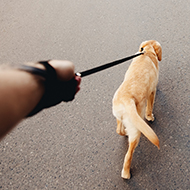
Thieves will face up to five years in prison.
A new offence that will see the introduction of tougher prison sentences for those who abduct dogs has moved a step closer under plans announced by the Government.
The dog abduction offence, announced by Defra in September, has been added by ministers to the Kept Animals Bill, which was set out in parliament today (18 November).
The move aims to crack down the surge in dog theft and will see those who steal much-loved pets face up to five years in jail.
Currently, dogs are treated in law in the same way as inanimate objects, like laptops or mobile phones. This new offence will consider the emotional distress caused to both pup and owner and will help judges hand down more targeted sentences and penalties.
Defra states that a provision will be included in the Bill to extend the offence to other pets in the future, 'should evidence support this'.
Chief Veterinary Officer Dr Christine Middlemiss welcomed the move, adding: “The recognition of the distress caused to animals by pet theft is an important step forward, treating them as sentient beings rather than merely property. The new offence should build greater awareness of the significant impacts of dog theft on people and animals, and reassure pet owners that these crimes are being taken seriously.”
Environment secretary George Eustice added: “The loss of a much-loved pet causes unique distress. I am pleased that we are legislating to recognise this specific crime. The new dog abduction offence will reflect the impact on animals in penalties for criminals, and deliver justice for victims.”
The announcement forms part of the Government’s response to the recommendations of the Pet Theft Taskforce, which was launched in May 2021 in response to a reported rise in pet thefts during the pandemic.
According to Defra, there were more than 2,000 incidents reported to the police last year, and around seven in 10 crimes involving animals recorded by police involve dogs.
David Bowles, RSPCA head of public affairs, said: “The theft of a pet is devastating and we’re pleased the Government has announced these amendments which we hope will act as a real deterrent to those who carry out this crime.
"While the current proposed law applies to dogs, we are really pleased to see the Government has also recognised how much other animals mean to people as well and put in provision to extend it to other pets. We hope this new law, which will see sentences up to five years, will help crackdown on the heart-breaking issue of pet theft.”
Paula Boyden, Dogs Trust veterinary director, added: “Having your beloved pet stolen is an extremely stressful, often heart-breaking experience. For years, Dogs Trust has called for harsher penalties to deter those who profit from this despicable crime.
"We wholeheartedly welcome the measures the Government has taken today to tackle pet theft and prioritise the welfare of our pets as sentient beings, and very much hope that the increased sentencing will make pet thieves think twice.”



 The Animal and Plant Health Agency (APHA) has updated its online reporting service for dead wild birds.
The Animal and Plant Health Agency (APHA) has updated its online reporting service for dead wild birds.